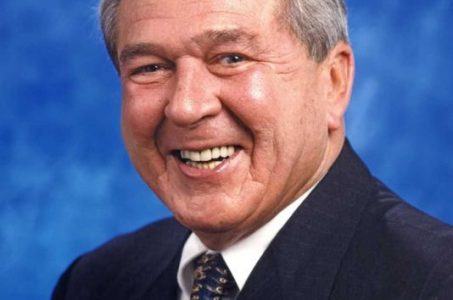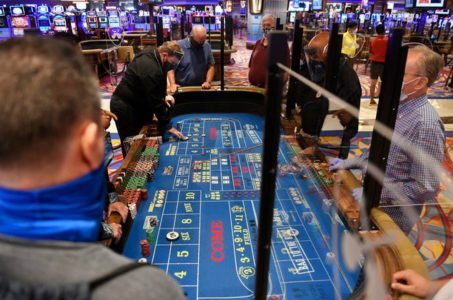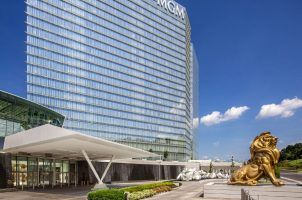Macquarie Survey Says Travelers Want Virus Vaccine on Market Before Visiting Vegas
Posted on: July 24, 2020, 01:42h.
Last updated on: July 24, 2020, 02:50h.
It could be a while before Las Vegas looks like it did prior to the emergence of the COVID-19 pandemic. That return to normalcy is apparently tethered to efforts to develop a vaccine that will vanquish the virus.

A survey by research firm Macquarie indicates many would-be Sin City visitors want a vaccine to come to market prior to visiting the largest US gaming center.
To be precise, 65 percent of the 417 adults, ages 21 and up, polled by the brokerage house say they won’t travel to Las Vegas until an approved coronavirus treatment is accessible.
Macquarie gaming and leisure analyst Chad Beynon said that, based on last year’s visitation numbers, 65 percent equals 28 million people. Bottom line: COVID-19 is a major curveball the US gaming capital couldn’t see coming, and the second wave of the virus is hindering the city’s recovery efforts.
Following five years of 42 million visitors, 2020 was expected to break that mark, given major demand-drivers such as the once-every-three-years ConAgg (it happened, but not with full attendance), the NFL Draft, and the Allegiant Stadium opening,” said Beynon. “However, COVID-19 disrupted these plans, setting up 2020 for some of the worst visitation trends in decades (-51 percent year-to-date).”
As competitions and leagues were canceled or shut down starting in March, the NFL pulled the draft from Sin City, opting for a studio format. However, the city will host the event in 2022.
Vegas: Between a Rock and a Hard Place
It’s been nearly two months since Nevada casinos reopened. But as the initial enthusiasm wears off, it’s becoming evident that this is far from a normal operating environment. When Las Vegas Sands (NYSE: LVS) reported second-quarter results earlier this week, executives from the Venetian operator said Sin City is “in a world of hurt” and a “difficult place to be.”
Rival Wynn Resorts (NASDAQ:WYNN) is reportedly furloughing some employees at the Wynn and Encore on the Strip. Compounding those woes are other data points from the Macquarie survey, including 40 percent of respondents saying they won’t book a Vegas vacation without a coronavirus vaccine on the market. Just 12 percent said they feel comfortable traveling to the city today, while 30 percent said they’d feel safe going there three months from now.
For operators, there are hits to the top and bottom lines on multiple fronts. Beynon points out that 2019 gross gaming revenue (GGR) in Las Vegas was one percent below the all-time high set in 2007. But revenue from non-gaming amenities — beverage, food, lodging, shows, and others — accounted for 65 percent of 2019 turnover in Sin City, and surged 30 percent since 2007, growing far more rapidly than gaming volume.
Highlighting the city’s correlations to vaccine development and why many analysts prefer regional operators, Beynon’s 2021 base case for Las Vegas calls for 39 million visitors spending an average of $423 per person, with GGR and net revenue each declining 18 percent.
The gaming hub hasn’t been below 39 million annual visitors since 2011, and that $423 spending figure is merely in line with the post-global financial crisis average.
Murky Vaccine Outlook
Adding to the pressure on Las Vegas operators is an issue they cannot control: the vaccine timeline. While several companies, including Gilead, Johnson & Johnson, Moderna, and Pfizer are making progress, a safe antidote to the coronavirus is still probably several months away.
The base case scenario is that health officials and regulators will have an answer on at least one of the vaccines currently in development by December or early 2021. Assuming that news is good, it would still take several months before the product could be widely distributed.
Vegas rebound hopes could be pushed to the second half of 2021, with 2022 being the earliest 2019 capacity levels could be approached.
Related News Articles
Golden Entertainment Could Glitter with Regional Catalysts, Strat Renovation
Maryland Casino Revenue Wanes Nearly Five Percent in August, Gamblers Lose $161.4M
Most Popular
Las Vegas Overstated F1 Race’s Vegas Impact — Report
Vegas Strip Clubs Wrestle in Court Over Animal Names
ESSAY: Remembering ‘The Beatles LOVE’ in My Daughter’s Eyes
Most Commented
-
End of the Line for Las Vegas Monorail
— April 5, 2024 — 90 Comments -
Mega Millions Reportedly Mulling Substantial Ticket Price Increase
— April 16, 2024 — 6 Comments -
Long Island Casino Opponents Love New York Licensing Delays
— March 27, 2024 — 5 Comments -
Nearly Abandoned Mall Outside Vegas Soon to Have Only One Tenant
— March 12, 2024 — 5 Comments
















No comments yet